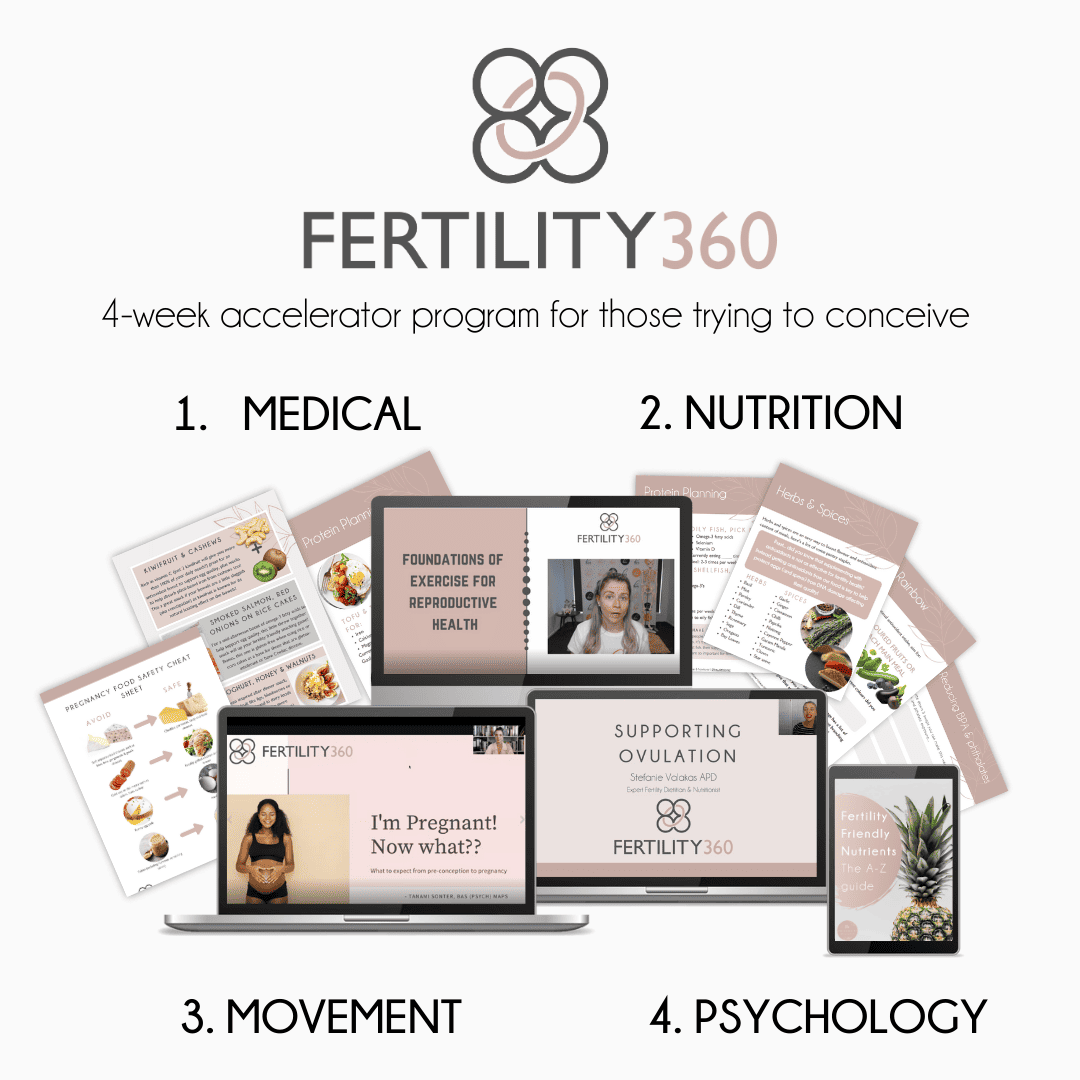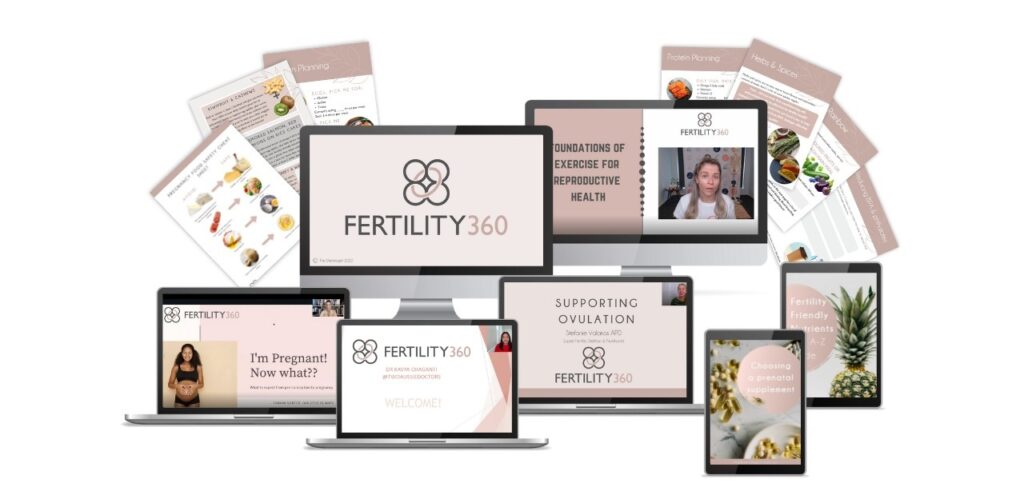Ever heard of the phrase, “it takes a village to raise a child”? Whilst it is undeniable raising a child takes a lot of time and energy, I truly believe that for many it also takes a village to conceive a child too.
1 in 6 Australian couples experience delays to conception (sub-fertility) and infertility, and there are more and more people seeking fertility care and interventions. A great team of health care professionals that are supportive of your goals and dreams and are, qualified and absolute experts at what they do!
As fertility dietitians & nutritionists, we are experts in fertility and pre-conception nutrition but we aren’t experts in exercise, psychology, medicine, embryology, genetics and so so much more than all can provide such value, support and reassurance in reaching your goals of growing a family.
So, naturally, it takes a team of various team members – a village, so to speak – to support you on your trying to conceive journey. This is commonly termed in the health care space as a multi-disciplinary team (or MDT, for short).
What is a Multi-Disciplinary Team?
Multi-disciplinary team care involves multiple health care professionals from a variety of disciplines involved in the care of one person. The goal is for the health care professionals to participate in a collaborative way and communicate in order to address as many aspects of a person’s care as possible. This is generally considered a more comprehensive way to look after a person’s health needs and ideally creates cohesion in the care and streamlines the interventions and strategies a person is receiving from their health care team.
An example for a multi-disciplinary team when experiencing infertility or delays to conception could include your GP or PCP, your fertility specialist & fertility team (nurses, embryologists etc), your fertility dietitian (that’s us), your psychologist & your acupuncturist.
Or perhaps a genetic concern has been identified in your pre-conception screening, you can Each team member has their role to play in your care with their own perspectives, opinions, approaches and tools towards your goal and the team’s common goal of helping you conceive.
The linchpin of a great multi-disciplinary team. is in fact communication & collaboration, you can have lots of team members but if they’re all singing a different song it can leave you feeling really confused and more overwhelmed. So communication between health care providers is absolutely critical to delivering multi-disciplinary care that benefits rather than hinder an individual.
Are you planning to start trying to conceive in 3-12 months?
Boost Your Fertility Knowledge with our first-of-its-kind approach!
With Weekly Modules from 4 Key Professionals in fertility and Pre-Conception!

What are the Benefits of a Multi-Disciplinary Team for Fertility?
So, you may be thinking wow that’s a lot of people, which means more appointments, more time and ultimately more money. And you’re right!
So what are the benefits of a multi-disciplinary team when it comes to fertility care?
- You’re getting the best of each health care provider. Rather than asking your doctor or nurse who has limited knowledge about nutrition or exercise when it comes to fertility, IVF or pre-conception. You can get specific, tailored and expert advice from a dietitian and exercise physiologist who have studied and practised in just that area. They keep up to date with the latest research in their field and essentially you’re getting the best out of each expert!
- Reduced confusion & improved clarity – in our experience, people with a great multi-disciplinary team are less likely to Google things and send themselves into a tailspin about what Dr Google said but rather call, email or raise the questions they have with the relevant health care provider in the next appointment.
- Feeling supported in terms of your physical and mental wellbeing through the process. After all, the end goal is great but if you lose aspects of your health along the way, that isn’t going to be helpful for anybody! PLUS, a healthy body and mind is a great foundation for conceiving a healthy happy baby too.
- Knowing that you’re doing all that you can and seeking expert input in each area to enhance your chances of success, truly means the world to many clients that we see. As if things don’t go your way, you can continue on without the “what if”.
- Collaborative and communicative care helps save you time, energy and generally money too. Think of the times you’ve had the same test done multiple times as another practitioner wants it done their way, or send you for additional testing that could have been batched.
- Optimises your safety, avoiding medication, food and supplement interactions is much more likely with great communication between providers. Medication and supplement names are hard to always recall but are critical to getting right to ensure your safety! So relying on you just to let us know can be an issue! A great summary from the medical team can be incredibly useful.
- Helps keep your care about you and goal-orientated towards what you want to get out of your treatment! Having a common goal in a multidisciplinary team is crucial to keep everything on track and about your goals and needs. A great MDT always puts this first!
Are there any downsides to a Multi-Disciplinary Team for Fertility?
Now, there are a few key downsides of a multi-disciplinary team:
- Time to go to each appointment
- If coordination between providers isn’t smooth this can cost you more time and energy
- The expense of engaging with multiple health care providers
However, if you can make it work, I truly believe the benefits will outweigh the downsides when it comes to multidisciplinary care for fertility.
How to Build Your Own Multi-Disciplinary Team
Building your own multi-disciplinary team can take some time and research to find qualified health care practitioners that align with your goals and values and that collaborate together too.
Here are some tips in getting started to build your own multi-disciplinary team:
- Do your research – find some recommendations from health care professionals in your circle already, word of mouth (friends or family or community online that are going through similar experiences to you) and see if you can chat to them (e.g. via phone, email, discovery call or on social media) to get a feel if they’re the right fit for you.
- Have some goals and areas of focus going in – focus on a few key areas at a time and find health care professionals that align with those goals in terms of their expertise. For example, if you want to work on your diet and lifestyle – then speak to a fertility dietitian. Need help with exercise? See an Exercise Physiologist. Struggling with the toll of infertility and fertility treatments are having on your mental health? See a psychologist.
- Encourage your team members to communicate with each other – most health care providers need to write a report or letter to communicate their assessments, findings and plans. Communicate who’s on your team so they can all be on the same page and that reduces the burden on you to relay information all the time.
- Engage regularly – one-time sessions are rarely the answer to getting the most from any health care provider (there are a few exceptions to this), so make sure that you’re aware of the frequency and level of commitment required when engaging with a new discipline, as it may be different to others you’re experiencing.
We have been busy working away on what is an absolute DREAM project for us here at The Dietologist, alongside some fabulous collaborators to bring you a first-of-its-kind fully online program designed to cover the fundamental aspects of medical, nutrition, exercise and psychology to optimise your chances of conception in a really supportive and empowering environment.
It’s called Fertility360, and we would love to invite you to join us!

If you feel like your high school health class didn’t teach you much about your reproductive health and fertility beyond how NOT to get pregnant, But now, that you DO, it feels like there isn’t any classes or guidance about what to do next. Then Fertility360 is for you!
Inside we provide a 360-degree approach to optimising conception, each developed and presented by respected and leading professionals in each discipline to bring you confidence, clarity and calmness on your pre-conception and fertility journey. The magic truly happens when these 4 areas of health crossover, medical, nutrition, exercise & psychology and we would love for you to experience it first-hand and be part of the community!
Check out our expert contributors inside Fertility360 bringing you lessons, downloadable and weekly Q&As inside our exclusive community over the month of August.
You will walk away from Fertility360 with more confidence, clarity and calmness as you head into parenthood! So if you’d like to learn more about Fertility360 and join us for this event to help educate, empower and nourish you on your journey to growing your family, then we would love to see you there!







